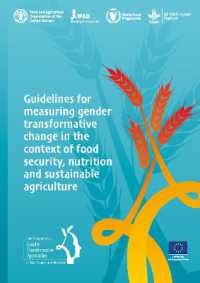- ホーム
- > 洋書
- > 英文書
- > Nature / Ecology
Full Description
Offering an exciting ride into how the world could be, this book is the one we have been waiting for. Feminists have long been saying we could do life differently, here is the local and global exploration of what needs to change, what must go and how together we can make a new reality. A visionary book with a focus on local and global politics and social movements, Wild Politics presents a powerful critique of global western culture. Susan Hawthorne unpicks the structures of power and knowledge, law and international trade rules, as well as probing issues that intimately affect our daily lives. Wild Politics concludes with a compelling vision for a world inspired by biodiversity
Contents
Acknowledgements
Permissions
Preface to the 2022 edition
INTRODUCTION
A Feminist Critique of Western Global Culture
Cultural Logic
Decolonising Scholarship
Biodiversity and Seeds
The Seed of Culture
Weaving the Strands
Defining the Wild
CHAPTER ONE
The Principle of Diversity
Beginnings
Thesis, Antithesis, Synthesis
Feminism
Change
Creating Feminist Knowledge
Who is the Knower?
Standpoint Theory
Analysis
Synthesis
Dissociation
Associative Thinking
CHAPTER TWO
Power and Knowledge: Global Monotony or Local Diversity?
Power
The Power of Violence
The Power of Reward
The Power of Backlash
The Power of Obstacles
The Power of Systems
The Power of Attraction
The Power of Attitudes
Knowledge
Assimilation and Appropriation
A Clash of Knowledge Systems
Not seeing
The Perceptual Gap
How Knowledge is Valued
Cultural Homogeneity
In Defence of Diversity
CHAPTER THREE
One Global Economy or Diverse Decolonised Economies?
The Logic of Neoclassical Economics
How Women Are (ac)Counted
Economic Homogeneity and Globalisation
Decolonising Economics
Feminist Economics
Ecological Economics
Toward a Wild Economics
CHAPTER FOUR
Land as Relationship and Land as Possession
Land as resource or relationship?
Wilderness
Land
Dealing with Waste
"Freeing" the Land, Enclosing the Commons
Feminist conceptions of land
Indigenous conceptions of land
Land as possession
Tourism: land and wilderness as commodity
Urban land
Urban land as wild space
Steps to developing a wild politics of land
CHAPTER FIVE
Farming, Fishing and Forestry: from subsistence to terminator technology
Farming in Kenya and Nigeria
Forestry in Lithuania, the USA, Bangladesh and Sri Lanka
Fishing in the Pacific
Digitised and globalised farming: what the future holds
The Kyoto Protocol, plantation forests and Terminator Trees
Fishing wild fish to feed domesticated fish
The commodification of "everything"
Women as keepers of ecosystems
CHAPTER SIX
Production, consumption and work: global and local
Production and disparity
Consumption and disparity
Work and disparity
Global production
Global consumption
Global work
Local production
Local consumption
Local work
Military as gross producer and consumer
Conclusion
CHAPTER SEVEN
Monocultures and multilateral trade rules
Patents
Multilateral trade agreements and the shape of international law
Multilateral trade negotiations and the convention on biological diversity
The World Trade Organisation (WTO)
Trade related Intellectual Property Rights (TRIPs)
Food security
The Multilateral Agreement on Investment (MAI)
Traditional Resource Rights (TRRs) and Community Intellectual Rights (CIRs)
Human Genome Project (HGP) and Human Genome Diversity Project (HGDP)
Conclusion
CHAPTER EIGHT
Wild Politics
Wild Politics: A vision for the next 40,000 years
Appendix
Tables
1. World's 100 largest economic entities (2001)
2. Companies, countries and name changes
3. Areas of highest cultural and biological diversity
Glossary
Abbreviations
Bibliography








